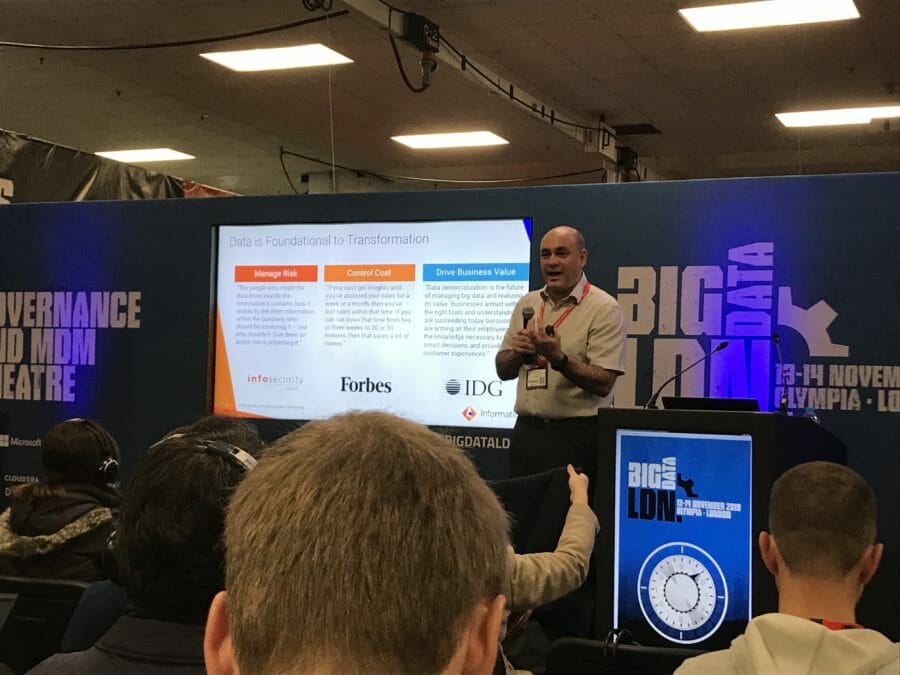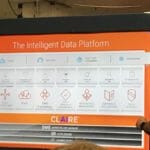Intelligent data governance is needed to deliver business value, but there’s a problem; governing data has become more complex.
While the need for good quality — ‘governed’ — data is increasing, organisations are rapidly realising that the capabilities of the past won’t scale for future needs.
The realisation that data governance without implementation is just documentation, and that documentation is instantly obsolete, is hitting home with many.
Exploring this topic at Big Data LDN, Steve Holyer — data governance and privacy solution specialist at Informatica — explained how to scale intelligent data governance to improve quality, access and compliant use of data to drive business value.
Information Age Roundtable: Developing a data and AI strategy
Data governance is getting harder
Governing data is getting harder, because there is an expansion of data; there are new users, new types of data (smart meters, for example) and the marketplace is changing with data’s movement to the cloud and the use of it as an engine for AI/ML.
“With all this new data, it’s hard to understand it, from the metadata to the business context,” said Holyer. “If you don’t get it right, the outputs are wrong.
“Data is an asset that should be used to drive businesses forward.”
Data is foundational to transformation
There are three key areas where data can lay the foundations for transformation and help organisations gain competitive advantage:
1. Manage risk
“The people who create the data know exactly the data it contains, how it relates to other information within the company, who should be accessing it — and who shouldn’t. Give them an active role in protecting it” — Roy Peretz, VP product management at Opora, writing in Infosecurity magazine.
2. Control cost
“If you can’t get insights until you’ve analysed your sales for a week or a month, then you’ve lost sales within that time. If you can cut down that time from two or three weeks to 20 or 30 minutes then that saves a lot of money” — Naveen Peddamail, senior manager software engineering at Walmart Labs, as featured in Forbes.
3. Drive business value
“Data democratisation is the future of managing big data and realising its value. Businesses armed with the right tools and understanding are succeeding today because they are arming all their employees with the knowledge necessary to make smart decisions and provide better customer experience” —
Eric Matisoff, Contributor for InfoWorld, writing in InfoWorld.
The data journey: It’s only the beginning for digital transformation — Big Data LDN
The impact of assumption
There are clear benefits to using data, but if organisations use the asset incorrectly they’ll lose it.
“People assume a lot about data and make business decisions based on graphs, but they need to understand where data has come from and what it is,” explained Holyer.
“Without understanding what it is or what you’re looking for, you’ll get it wrong.”
This ‘assumption’ creates a number of negative outcomes; missed opportunities like targeting the wrong customers, errors in judgement and actions which lead to making wrong business decisions, overconfidence and a general misunderstanding within the organisation.

Stop assuming and use the metadata
Organisations need to stop assuming and get into their metadata to understand what data they have, where it is and how it is already impacting their business.
What sorts of metadata are there?
According to Holyer, there’s “technical understanding (what data an organisation has), business relevance (why has an organisation got the data), operational practice (how is it flowing through organisation and what department is using it for what) and access to that data (for regulations like GDPR).”
There are three common sources of metadata, much of it already exists and it can be discovered.
1. What we know: business process models, project plans, data quality specs and programme documentation.
2. What we think we know: talk to the ‘expert’, email the superuser, poll that team and check emails.
3. What we can discover: go look manually, use technical tools and automated discovery loading.
Cloud, infrastructure modernisation and data governance — defining IT success in 2019
Intelligent data governance
Intelligent data governance enables the utilisation of data to drive business value.
Organisations need to add intelligence, because; the volume and complexity of data is increasing, there is a lack of awareness around metadata, data and data process. “It’s like finding a needle in a haystack,” confirmed Holyer.
To mitigate these challenges organisations should deploy an intelligent data governance platform that can automatically apply different rules to different datasets across an organisation. This not only adds efficiencies, but “if you can understand where the data or information is from a governance point of view, then applying masking and security [becomes easy],” Holyer explained.

CLAIRE is Informatica’s engine that powers its intelligent data governance platform; using automation, data similarity, automatic tagging, proximity checking and more to help organisations utilise their data.
Why does it matter?
Understanding where data is, what it is and how it can be used appropriately — data governance — in an intelligent manner can help businesses produce actionable insights that can lead to significant transformation.
This is not just an IT exercise and to achieve the desired results, the business must ask the right questions; what data already exists, how are we using that data, how do we integrate intelligent data governance?
“Different areas of business will use data in a different ways, but they need to connect every line of business into one place so that it is consumable and reusable,” continued Holyer. “Everyone needs to use the same rules.”
Intelligent data governance will allow AI to better understand an organisation’s data and help support better business decisions. To succeed in this, the business should standardise on technology, create a metadata catalogue and build trust with automated quality, lineage and governance.
“Those who own data own the future, but only if you know what data you’ve got,” concluded Holyer.







